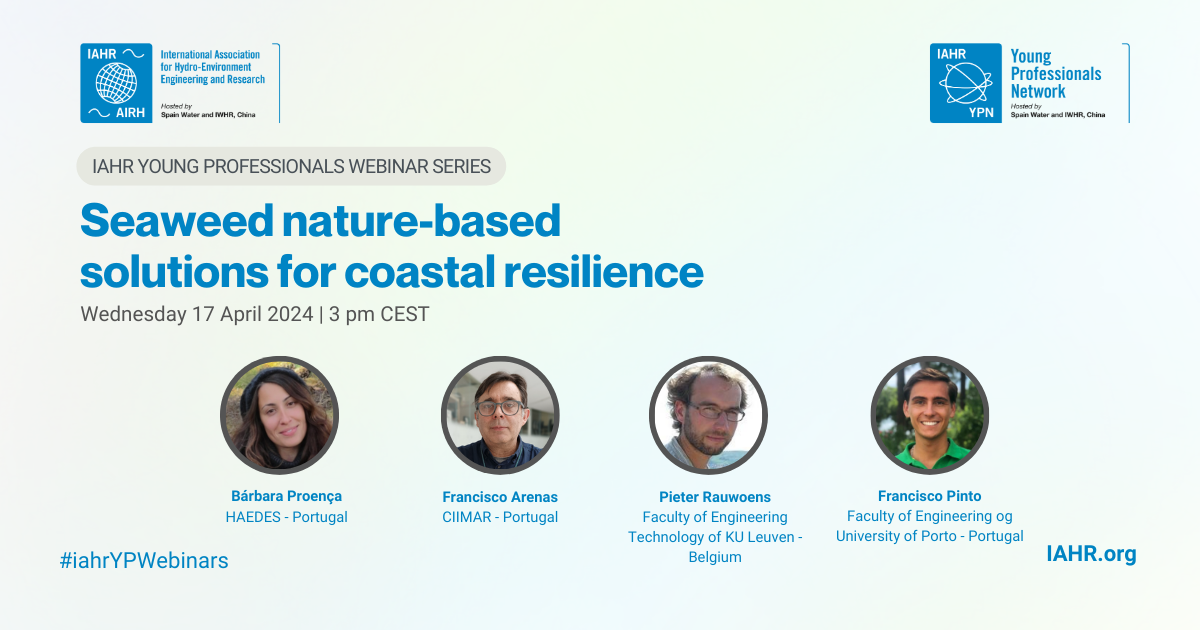Summary Report | Webinar on Seaweed nature-based solutions for coastal resilience
IAHR YP Webinar Series Watch on demand Keep updated
Introduction
Under the world’s current global climate context, there is an urge to find solutions that combine ecological and technical/engineering issues to improve coastal resilience. Nature-Based Solutions (NBS) seem to be a promising alternative.
In this workshop we discussed the current status of NBS for coastal resilience, focusing on using the capacity of natural ecosystems to increase coastal resilience while providing their biodiversity and numerous other ecosystem services that underpin human wellbeing. The discussion focused on kelp forests and how they could be used as NBS. To this end, two ongoing projects were presented:
The BlueForesting project – the ecological value of kelps and the importance of restoring these ecosystems.
The AQUABREAK project – the use of seaweed aquaculture as NBS to promote wave energy reduction and coastal resilience.
The presentation of the projects were designed to illustrate the use of seaweed-based ecosystems as NBS (case studies).
Summary
AQUABREAK: A nature-based solution combining seaweed aquaculture and coastal resilience by Bárbara Proença.
Bárbara Proença talk focused on the presentation of the project AQUABREAK, funded by EEA Grants, and its main results. The project aimed at developing a NBS combining seaweed aquaculture and coastal resilience. With both physical and numerical modelling we verified the wave attenuation potential of a floating seaweed field and were able to design a robust structure that endures open sea conditions. During the discussion we assessed the feasibility of commercial exploitation of such a multi-purpose solution, that needs to match the organism’s life cycle and seasonal needs for coastal resilience. We have also discussed the viable seaweed species to be cultured, which must prioritize local species, as well as the needs for the implementation of pilot cases.
The main message she sent was the necessity to come up with coastal resilience alternatives or complements that are aligned with the source of the problems and can contribute with additional benefits for both the society and the environment, by promoting a connected development of coastal ecosystems.
Blueforesting: fostering climate change-ready marine forests by Francisco Arenas
Francisco Arenas gave a brief introduction to marine forests in North Portugal and the EEA grants-funded project "Blueforesting". Marine Forests are amongst the most iconic coastal habitats, supporting rich biodiversity, with the capacity to deliver key ecosystem services and support blue growth. Marine Forests can also be cost-effective Nature-Based Solutions with the potential to mitigate climate change. BlueForesting builds upon these ideas to develop science-based recommendations and guidance for protecting and restoring Marine Forests and their services under climate change influence, including identifying species and climate refugia areas. Portuguese marine forests stand out for their unique relict status, thriving in isolation from other European populations, owing much of their resilience to the summer upwelling. The significance of these unique marine forests as a nature-based solution remains a vital subject of ongoing research.
Discussion/Roundtable of questions. Moderated by Pieter Rauwoens, Member of the IAHR Working Group on Nature Based Solutions
The Q&A was led by Prof. Pieter Rauwoens, representative of the IAHR Working Group on Nature Based Solutions (NbS). As the design and the implementation of NbS involve many stakeholders, the discussion focused on the integration of stakeholders in de design process: Coastal Communities, Fisheries and Aquaculture farmers, NGO’s considering ecological preservation and Government. It also became clear that the engineers heavily rely on input from biologists. Indeed, different seaweed species behave very differently and the scaling is quite different. Both speakers highlighted the multiple benefits of NbS as an alternative to classical coastal protection measures and they stress the applicability of such solutions worldwide as a sustainable solution in view of climate change.
Programme
Introduction to the new Young Professionals webinar series by Francisco Pinto, Faculty of Engineering, University of Porto, Portugal
AQUABREAK: A nature-based solution combining seaweed aquaculture and coastal resilience by Bárbara Proença
Blueforesting: fostering climate change-ready marine forests by Francisco Arenas
Discussion/Roundtable of questions. Moderated by Pieter Rauwoens, Member of the IAHR Working Group on Nature Based Solutions
Speakers
Faculty of Engineering
University of Porto, Portugal
Faculty of Engineering Technology KU Leuven, Belgium
HAEDES
Portugal
CIIMAR
Portugal




